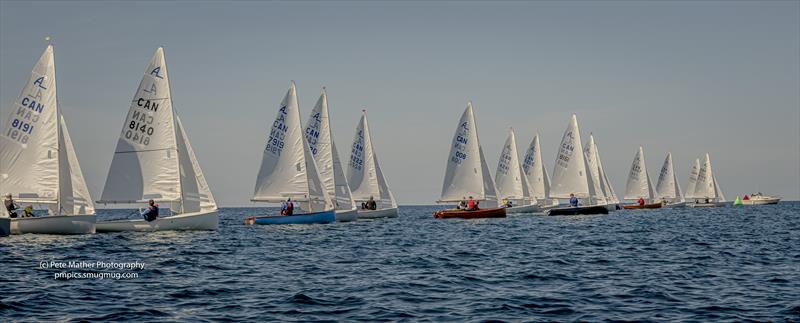
An interview with Justin Ahearn on the 2024 Albacore Midwinters Championship
by David Schmidt 16 Jan 16:00 GMT
January 19-21, 2024

2023 Albacore Canadian Championship © Pete Mather
In 1954, yacht designer Uffa Fox drew the basic linesplan for a tidy 15-footer employed a fairly deep and high-aspect centerboard, a big mainsail, and a fractional, overlsapping head sail. The two-person design didn't incorporate a kite or trapeze, making it suitable to a wide range of wind conditions, and its technical rig has been challenging wind technical-minded sailors for decades.
The boat became the Albacore, and hulls exist that are crafted from both wood and fiberglass. To date, some 8,200 have been built, and classes are active in Canada, the UK, and the USA.
This year's Albacore Midwinters Championship are being hosted by the Clearwater Community Sailing Center from January 19-21. Racing will unfurl on the waters of the Gulf of Mexico south of Clearwater Pass, and courses will either be windward-leewards or trapezoid shapes.
I checked in with Justin Ahearn, who serves as Clearwater Community Sailing Center's sailing director, via email, to learn more to learn more about this exciting warm-water One Design event.
Weather-wise, what kind conditions can sailors expect to encounter off of Clearwater in mid-to-late January? What are the best-case and worst-case weather scenarios?
Clearwater in January is a very mixed venue.
Wind is largely dependent on cold fronts from far away winter lows. As the front approaches, we get warm strong southerly wind. It's warm air over colder water so it can be very steady. The waves are organized and manageable.
The pass into the Gulf is safe no matter how windy it is. This direction is our best-case scenario. It gives everyone a great heavy wind warm-up before the front blows through and brings cold north west wind.
This wind is less friendly.
Depending on the strength of the front the conditions in the gulf range from sporty to unsafe. It's very fun sailing until it's not. The waves are much bigger and sloppier. They feel the bottom and become steep and short. It makes for very fun surfing conditions.
The wind is much colder and can be very gusty.
The pass faces into the wind and the outgoing tide can produce breaking waves. In between fronts the wind can be very light. High pressure to our north can give us light easterlies.
Typically, there is not enough heating to produce a sea breeze but it can never be ruled out.
Do you see local knowledge playing a big or small role in the regatta's outcome? Can you please explain?
I do not think sailing in the Gulf over the winter requires local knowledge. The open water typically does not produce any land effects that are unique to the area. The flat bottom makes the current is pretty even across the course.
The fronts are from storms that affect the rest of the East Coast, so the sequence is very familiar to most. It's just warmer here after the front blows through.
If you could offer one piece of advice to visiting (and local) sailors, what would it be?
Be ready for any condition and mind the outgoing tide when its windy from the northwest.
In the ideal world, how many races do you and the other organizers hope to score? Also, how many of these do you expect to be windward-leewards, and how many do you expect will be the trapezoid course? Or, will this be a wind-contingent call?
We will likely run three to four races a day.
Friday, we will likely run windward-leewards, and Saturday and Sunday we'll switch to the trapezoid course because the 420s will be joining us.
What kinds of post-racing/onshore entertainment can sailors look forward to?
We will host a dinner on our upstairs patio. Very casual.
This is what most sailors want but if you are looking for something more lively, Clearwater Beach has a very healthy nightlife.
Can you tell us about any efforts that you and the other regatta organizers have made to try to lower the regatta's environmental footprint or otherwise green-up the regatta?
Yes were trying to reduce our environmental footprint. To avoid disposables, we had a dishwasher installed and bought a ton of glass plates.
We avoid plastic bottles by stocking the boats with water coolers.
Our race committee fleet is smaller in size than most, so that cuts down on some fuel consumption.